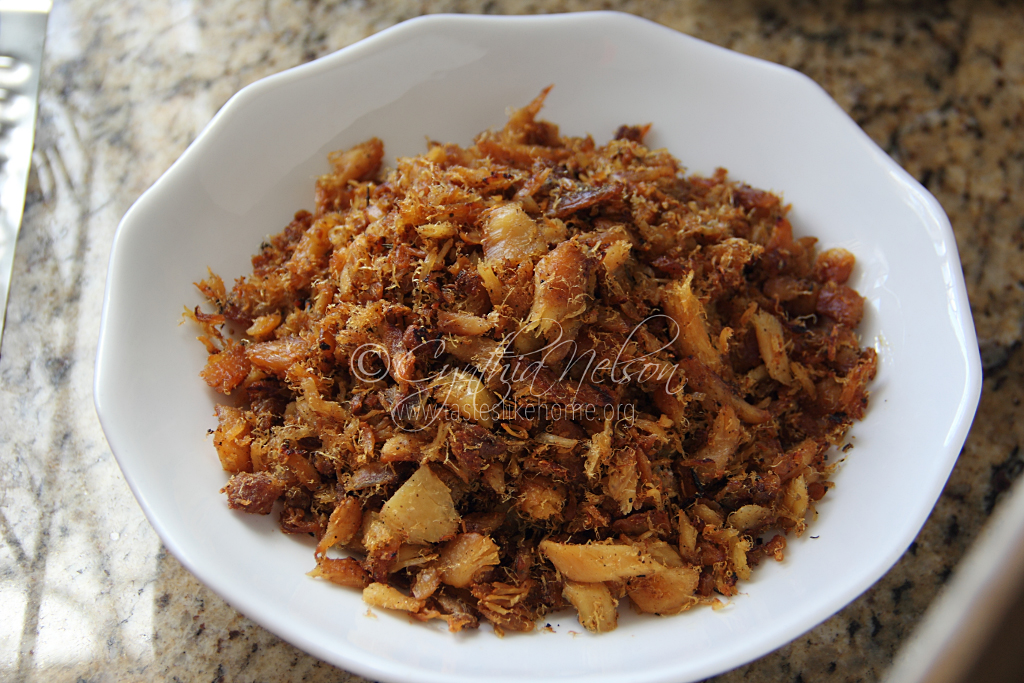 There are many ways in which you have had salt fish before, most notably and popular is with fried dough, whether called bakes, floats, Johnny cakes, or muffins. And, you’ve had it stewed in an onion-tomato sauce spooned over Cou-cou, whether made of cornmeal, breadfruit, or green bananas and boiled ground provisions. I am certain you’ve had salt fish sauteed on its own served with dhal and rice, or with potatoes, or vegetables like, ochro/okra, pumpkin, and eggplant. And you’ve definitely had it topped and cooked in with dishes such as Shine Rice, Metemgee, Rundown or Oil Down. But let me ask you this, have you ever had salt fish as cooked crispy bits? No? Read on.
There are many ways in which you have had salt fish before, most notably and popular is with fried dough, whether called bakes, floats, Johnny cakes, or muffins. And, you’ve had it stewed in an onion-tomato sauce spooned over Cou-cou, whether made of cornmeal, breadfruit, or green bananas and boiled ground provisions. I am certain you’ve had salt fish sauteed on its own served with dhal and rice, or with potatoes, or vegetables like, ochro/okra, pumpkin, and eggplant. And you’ve definitely had it topped and cooked in with dishes such as Shine Rice, Metemgee, Rundown or Oil Down. But let me ask you this, have you ever had salt fish as cooked crispy bits? No? Read on.
Everyone has a particular way in which they like to cook and eat salt fish. A lot of people do not like it with tomatoes, while others only want it cooked with onions and lots of black pepper; some like it with a sauce and some don’t. I have to admit that growing up I never liked salt fish, it was only after moving to Barbados and yearning for a taste of home that I decided to cook salt fish to eat with dhal and rice (one of my Mother’s favourites). It was here (in Barbados) that I also had salt fish Buljol (pickled salt fish) for the first time and liked it. Salt fish is one of those things that I cook only when I feel like having it, though I always have salt fish in the refrigerator.
The other day as I was rearranging some stuff in the refrigerator, I noticed that I had 3 packets of salt fish and was about to put in the other packet that I had just bought. Go ahead and roll your eyes if you like, I did, because I asked myself why I keep buying salt fish and not cooking it often enough to make sense of the purchase? And, as you know, salt fish ain’t cheap. Anyway, in an effort to ease my conscience, I decided that I was going to fry some salt fish and have it there to eat with anything I wanted.
The last time before this most recent time when I had cooked salt fish, I had let the salt fish that was directly touching the bottom of the pan get brown and a little crisp and found the flavour enhanced, and the crisp bits mixed with the softer flakes was a complimentary and contrasting combo. Therefore, this time, I set out to make all the of the salt fish crispy, not just the bottom. The result was a resounding success. I had a pan full of crispy bits of salt fish (think bacon bits), and I have been using it regularly over all sorts of things (which I am going to tell you about). One of the best things about the salt fish cooked this way, is that it stays crisp for weeks in the refrigerator in an airtight container. Another good thing is that to use the salt fish cooked this way you do not have to reheat it. Use it straight from of the fridge. The residual heat from any of the hot foods to which it can be added is all you need.
Uses – Crispy Salt Fish Bits
Sprinkle lightly or generously over:
▪ Eggs – cooked any way
▪ Sauteed vegetables
▪ Sauteed potatoes
▪ Potato or Sweet Potato salad
▪ Fried Rice or any type of vegetable rice
▪ Rice and Peas
▪ Cook-up Rice
▪ Boil ‘n fry ground provisions
▪ Dhal
▪ Soups
The salt fish bits can be pounded and mixed into any type for ground provision foo-foo. One of my favourite ways is to pound and mix it into fried green plantains, similar to Puerto Rican Mofongo. This is a meal in itself and is great at any time of the day.
Here’s the thing, if you like salt fish, you will find numerous ways to incorporate it in this crispy form.
Making Crispy Salt Fish Bits
This is not a recipe, more of a guide. The important things would be to not rush the making of it, mine took half an hour; and maintain the recommend heat level (which could vary because of the type of pan you are using).
I used bone-in salted cod and a cast iron skillet.
Boneless or bone-in salt fish can be used. Remove most of the salt from the salt fish by soaking it for 16 – 18 hours in room temperature water, changing the water 3 – 4 times. Do not boil the salt fish to remove the salt or do not add boiling water to soak the salt fish as using either of these methods would alter the texture of the final product. Bear in mind also that there should be some salt (to taste) remaining in the salt fish. You don’t want to have to add salt when cooking. Please note that the soaking time will vary depending on the quality and thickness of the salt fish.
Once the fish has been rehydrated and softened, clean it by removing any scales, skin, bones etc. as is necessary based on the type of salt fish being used.
Flake the fish into small bits and rinse by placing it in a large sieve under tap water. Press the excess water from the salt fish and leave to drain for a few minutes.
These are optional flavour ingredients you can add – fresh fine thyme, remove the leaves, dried garlic, fine granulated or garlic powder if it is labelled that way, you do not want the garlic to be like dust-powder, it should be a very fine granule. Another ingredient, ground black pepper, if
you can do freshly ground black pepper, that would be ideal but use what you have. Use quantities of these ingredients to suit your taste.
Place a pan with a neutral flavoured oil over medium heat to get hot. Start with 6 – 8 tablespoons of oil. When the oil is hot, add the salt fish in an even layer and sprinkle on thyme, garlic, and pepper on top. Let cook until you see liquid, when you do, toss to mix in the thyme, garlic, and black pepper. Continue to cook until all the liquid has evaporated. By this time, you should start to get some stuck-on bits, be sure to scrap and remove them incorporating them into the rest of the salt fish.
Now, turn the heat to low and let the salt fish continue to get dry and crisp, toss well intermittently to ensure that all the salt fish is getting a chance to crisp up. This is where the patience comes in. Do not be tempted to raise the heat. The salt fish is done when it is no longer sticking to the bottom of the pan and when you toss and it drops back to the pan, you can hear the crisp dry sound against the pan. Let cool completely in the pan or transfer to a large plate and cool completely. Use immediately or store in an airtight container in the refrigerator. Access it with a clean spoon. The crisp salt fish will last for weeks but it is so good that you will find all sorts of ways to use it up.
In a separate pan I fried crisp some onions and hot peppers and added to the crisp salt fish when it was done cooking. This is optional.
Try it and let me know what you think.
Cynthia






